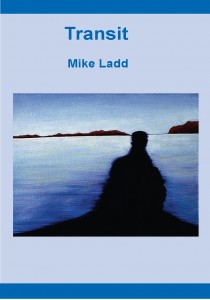 Transit by Mike Ladd
Transit by Mike Ladd
Five Islands Press, 2007
I find it a rare and lovely treat when a poet can become androgynous, or cross over discretely from a masculine voice to one that is feminine. While some of my favourite poets are steeped entirely in one gender or the other and that, indeed, can be their strength, I do want to draw attention to Mike Ladd. Perhaps his ability to move from soft themes of family and imagistic sensations to critical and satirical comments on the modern world is the reasoning for the title of Ladd's latest collection, Transit, because that would explain the great mystery to me. Without that possibility, I have one true criticism of this striking collection and that is the soundness of the title.
There is an inherent 'you' in so many of the poems, as well a number of poems set up as commands ('be intimate once more with the dirt: / in your plate, in your hair, / in the loop roads of your guts' from 'Camping Ground Desiderata'), and that does not even touch upon his sense of assuredness and grasp of perception throughout the bulk of the book, so it is as if Ladd is teaching us life's lessons, as if he has already disembarked, as if it is his readers who are in transit. The blurb on the back of his book suggests that perhaps Ladd is commenting upon the key 'transitional' moments in life but it appears to me that he is simply commenting upon life as is, the ordinary and mundane, and it is the case that he is very in tune with the enormity of it. I would say Mike Ladd is not in transit; he has arrived.
The first few pages had me rapt. I found myself becoming entranced by an observer of mornings, moods, lovers about to leap for the first time and lovers grown old together. In 'Old Love Song', for example:
The silence between them
would seem oppressive
if it didn't resound with knowledge:they've made each other's cloth so long
they weave it with their eyes shut.
Ladd's pace is subtle, his timing perfect. In a poem like 'That Christmas', there is a thought-provoking playfulness that is not practiced, but rather intuitive:
The time goes:
baby pics become high school formal photos.
This curious uncle watches little nieces
drive off with boyfriends,
infant nephews ride skateboards
and burn each other CDs.Did I sleep through something?
It was a big lunch, years ago,
and afterwards I lay down,
their voices washing over me
from the other room.
This poem instantly drew me in and I was unable to put the book down. In the middle of the book we are witness to the lasting effects of strangers, family, mentors and classmates, such as in 'Relief Teacher':
Our jeering so loud
the headmaster burst in,
led the old man away,
the last we saw of him.Among thousands of lessons
his I recall, one of a few.
Thirty years too late,
give him his due.
This recall of memory is then followed by distances of roads separating suburbia and the slight note of disparagement once we've reached somebody's home or office or, as the case may be, an office party at somebody's home. As an insider considering his immediate surroundings, Ladd is contemplative. As an outsider considering his peripheral, he is sceptical. This, for me, is where the change in voice occurs and, considering that it comes in the middle of the book, it happens at a perfect time. There is an occasional need for change in single collections of poetry; it can rejuvenate the senses and compel the reader to see the many faceted sides to a soul.
Nestled in the inside back cover to the book is a CD, which has an audio version of 'Rhapsody in Port Moresby', Transit's closing statement: a three-page poem written with the rhythm and intensity of the beat poets. The written version is so set apart from the rest of the collection that it seems a bit odd to be finishing off this experience in such a manner. However, the acoustic accompaniment makes it more of a grand finale. As Ladd produces and presents ABC's Radio National's poetry program Poetica, this denouement is a reminder of his love of sound and perhaps his compulsion for readers to hear words, rather than read their static representation. And continuing along this line, I cannot resist pointing out that I hold great admiration for poets who are brave enough to sneak in a random rhyme, and strong enough to make it work. Ladd is one of those poets and Transit is sprinkled with the one-off couplet. For example (from 'Morquong'):
Far away, a flock of birds
murmurs in its sleep –
a survivor tree
dreams of flight.The spaciousness of sound:
salt water writes salt ground.
I think Mike Ladd has succeeded in allowing us to hear the poetry (so for the poet to speak of 'Rhapsody' alongside a single pipe is not such a radical move). Ladd is so efficient with words, so precise in his meaning and tone, that I give Transit the praise it is due. This is a collection well worth the read; one that should encourage at least a second look. Perhaps it will create a desire among those newly acquainted with Ladd to search out his four other books (which cover a twenty-year span) and it will perhaps promote anticipation for a sixth collection in the very near future.
Heather Taylor Johnson holds a PhD in Creative Writing and is a poetry editor of Wet Ink.














